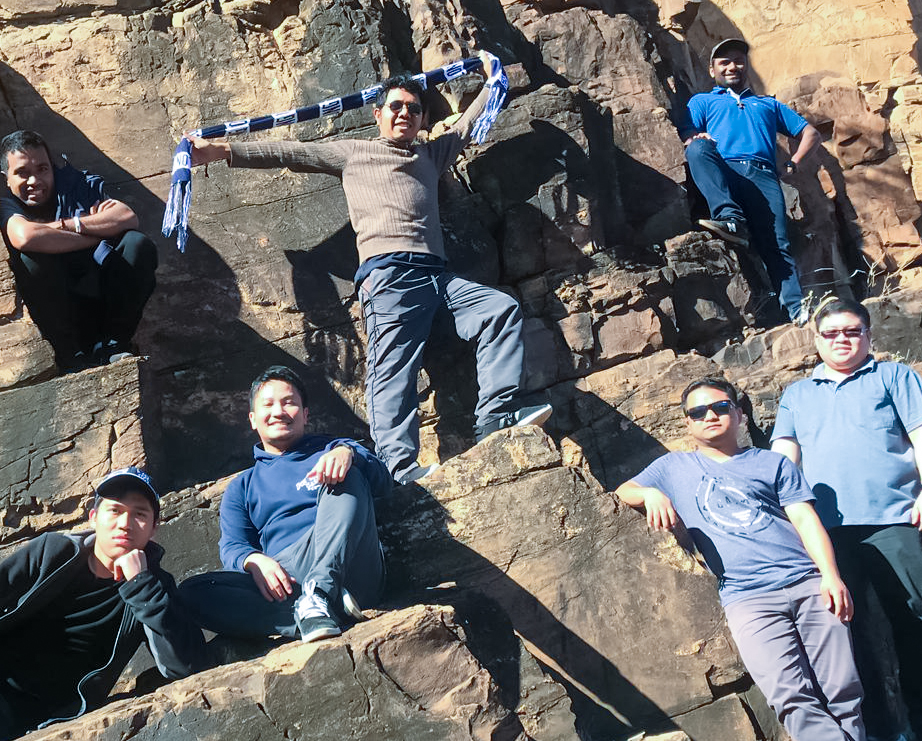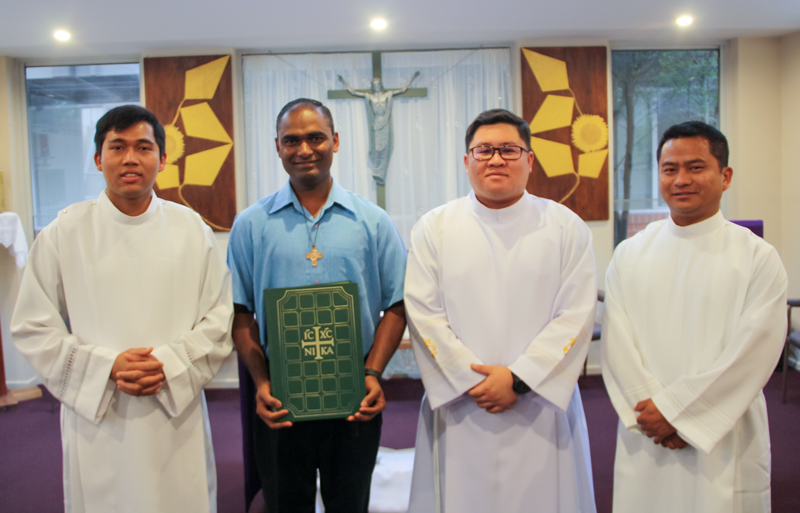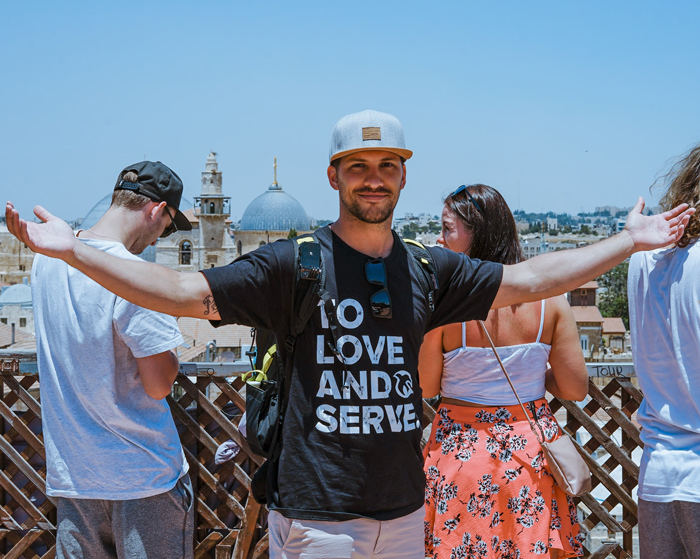- Home
- About Us
- SYM
- Salesian Family
- Contact Us
- Resources
- Shop
- Useful Links
- SFA 25
Every single person has their own, personal vocation - a calling from God on how they should live to life.
It is only through careful discernment, that is, journeying with God and fellow belivers that people are able to discover their vocation.
The word vocation comes from the Latin vocare which means "to call." This call can be lived out in various ways: single life, marriage, priesthood or consecrated life. These are ways of living in a supported and focused way.
To say yes to sharing your life and gifts for others in a focused way means saying no to other possibilities, no matter what way of life you choose there will always be choices, a vocation is the commitment to align your choices towards what is best for you and the world. In a Christian understanding, you can make a decision about your vocation, but that choice is a response to an invitation from God; to live in a way that allows you the freedom to live your most virtuous and gifted life.

Dear God,
You have a great and loving plan for our world and for me.
I want to do my part in your plan.
Help me to see the signs that You give me.
Open my heart to respond to You.
Grant me the courage to follow your call.
Give me the strength to serve You and your people with generosity and love.
Amen
The Salesian Vocation is lived out formally as Priests Religious Brothers and Sisters, as consecrated singles, as Salesian Co-operators and as people who are part of Salesian works as volunteers and employees.

Salesian priests work together with Salesian Brothers and are ordained to serve the needs of the young to whom they is sent. As a spiritual guide, the Salesian Priest is specifically trained to ‘tune in’ to the needs and interests of the young and he pays attention to their desires for understanding, love and guidance.
It is a common sight to find a Salesian priest in all kinds of recreational settings with the young, involved in their leisure activities and helping them to prepare for the future through Christian education and values.
He helps young people develop a spiritual life, so as to become good Christians and honest citizens. The Salesian priest brings the church to the young through his presence in schools, parishes, youth centres, retreats, camps and in anywhere young people can be found.
The Salesian Brothers commit themselves to follow the call of Christ who welcomes the young and the poor in their midst. As a vowed member of the Salesian community of Priests and Brothers, each Brother brings his own talents, gifts and personality to the service of the Church.
He shares the Gospel message of hope and life with the young. He joins other professed Salesian priests, brothers and sisters, in the vision and the meaning of life in a community setting. Living as members of the Salesian Family, they contribute responsibilities, talents and ministry experiences to help serve and educate the young of the world.
The Salesian Cooperators are single or married lay men and women, or diocesan clergy, who make a formal commitment to be part of the Cooperator movement to support the welfare of young people, and live guided by Don Bosco's Salesian Spirit.
Generally the Salesian Cooperators are affiliated with a local Salesian school, parish and youth centre. Some of the Cooperators work directly in Salesian ministries while others serve in their parishes or other ministries. Some Cooperators do not work directly with any particular ministry, but bring the Salesian Spirit to their work place, profession, and family.
The core of the Salesian Cooperators' commitment is to live his or her life as a good Christian or Catholic. The Salesian Co-operator embraces a Gospel way of life, sharing in the Church's mission to bring Christ to society, especially the young.
There are many people who work for the good of the young sharing in a Salesian Spirit. They share their talents and gifts in many varied Salesian works as single and married lay people.
They are involved in education, camps, recreation centres, youth programs, Salesian parishes and volunteer service programs.
Vocational discernment can guide you towards finding your greater purpose, your calling. Discernment techniques do not provide an instant answer to what your vocation may be. But help to recognize clues and reflect upon what you experience making connections and informed choices about how to live.
Your vocation tends to be something that makes you question what brings out the best version of yourself. A deeper understanding of your vocation demands a willingness to align with something far greater than oneself. The focus of a vocation is not “making a living” but rather “living a life.” It is less about what you do and more about who you are while you are doing it.
The process of vocational discernment involves much reflection on questions like:
What am I passionate about?
Be honest with yourself and acknowledge fears or desires that may be preventing you from reaching your potential.

Journaling is a beneficial way to deepen your understanding of your vocation. It is more than a diary of events, thoughts and feelings even though these may be part of a journal.
A Journal entry may include prayer, reflection on self and experiences and grappling with spiritual questions. A journal is helpful in seeing the movement and reoccurrence of themes which may indicate the vocational path to choose.
A Spiritual accompanier is one who through listening and questioning can help you focus on the movements in your life at a deeper level in order to discern how you may best live out your vocation.
Prayer is important in creating space to allow the divine voice within you that calls for fulfilment to be deepened and the call of the needs of the world to be heard clearly.
If you want to find what you are called to, then make time for prayer.
Lord I know that You love me and that You have great plans for me.
But sometimes I am overwhelmed by the thought of my future.
Show me how to walk forward one day at a time.
As I explore the various options which lie before me,
help me to listen openly to others, and to pay attention to what is in the depth of my own heart.
In this way, may I hear Your call to a way of life which will allow me to love as only I can and allow me to serve others with the special gifts You have given me.
Amen

To live and work together in community is for us Salesians a sure way of fulfilling our vocation.
Genuine concern for each other leads to sharing joys and sorrows, all we have, in community, in a family spirit according to the tradition of the first Salesian communities formed by Don Bosco.
Don Bosco spontaneously lived a trusting prayer life, inspired by St. Francis de Sales. Salesians today remain true to Don Bosco in joyful, creative, down to earth forms of prayer in community that energises their mission amongst young people.

Don Bosco lived a pastoral experience in his first Oratory which serves as a model; it was for the young people a home that welcomed, a parish that evangelized, a school that prepared them for life, and a playground where friends could meet and enjoy themselves. As Salesians carry out the mission today, the Oratory experience is still the lasting criterion in all our activities and works.
The Salesian mission of evangelization in the world is carried out in many different kinds of works in response to the needs of the poorest and most neglected young people, who are the first we are concerned about. We want to spend our lives for them following the example of our beloved founder, Don Bosco.
The Salesians are present in over 135 nations! The main apostolates for young people conducted by the Salesians in Australia, Fiji, New Zealand and Samoa include secondary schools, parishes, youth centres, hostels, retreat centres, camps and missionary work. In the 15 communities in our province, we aim to be ‘signs and bearers of the love of God for young people, especially those who are poor’.
Step 1: Pre-novitiate [6-12 Months]
Initial response to a sense of God’s invitation. ‘Come and See’ approach.
Step 2: Novitiate [1 Year]
A more intense initiation into Salesian religious life, living in community and growing closer to God, culminating in taking first religious vows.
Step 3: Post Novitiate [2-3 Years]
Beginning or continuing formal study to enable one to serve the Church and the young.
Step 4: Practical Training [2 Years]
A chance to use one’s learning and skills for a significant period in a youth setting, such as a school or youth centre.
Step 5: Theological Studies [3-4 Years]
Deepening the call, theological reflection, preparing for final religious vows, and, in case of a priestly vocation, ordination to the priesthood.


Heavenly Father, help all young people to discover their vocation in life and respond to your call with energy and commitment.
Call many to be Salesian priests, brothers and sisters after the example of St. John Bosco and St. Maria Mazzarello.
Give them the grace to respond generously and minister tirelessly throughout Australia and the Pacific, through Christ our Lord.
Amen.
Mary, Help of Christians – Pray for us!
For further information, contact: Fr Brian Ahern SDB Vocations Animator